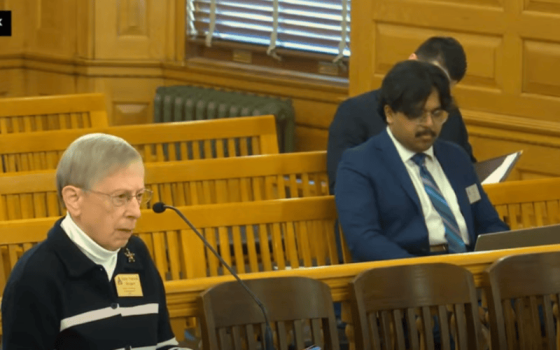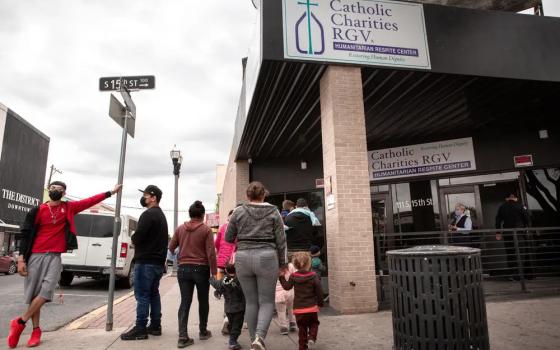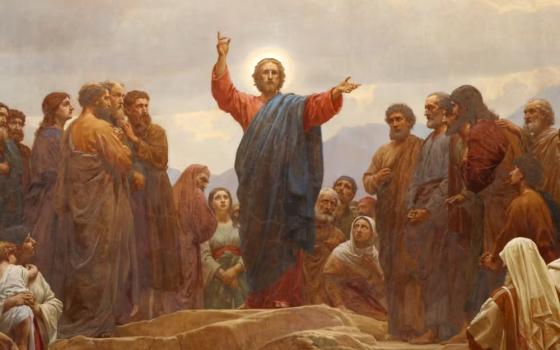
NEW YORK -- Thursday evening, Daniela Alulema looked out into the pews of the Church of the Holy Family and asked everyone gathered for a Woodstock Theological Center forum on migration to think back to when they were 14 years old.
“Now think about what would happen if, all of a sudden, your parents told you tomorrow you were leaving -- ‘We’re going to start a new life,’” she said. “That’s what happened to me when I was 14 years old.”
Her parents, both college graduates, had made the decision to leave Quito, Ecuador, in 2001 because of the tough economic situation, Alulema said, and to give her and her younger brother a better life.
Her father traveled first, in April of 2001, and Alulema and her brother joined him in August. Her mother followed a year later. Alulema remembers the disorienting experience of her first weeks and months in New York City: not speaking any English, starting 10th grade in a new school and learning to navigate the subway system on her own.
Alulema, now 23, quickly caught up to her peers -- learning the language, graduating high school at 16, and City University’s of New York’s Baruch College four years later, and finding a community of friends.
But although she now feels at home in the city, where she works as a bookkeeper and is active within the New York State Youth Leadership Council -- a youth and advocacy organization that works to improve opportunities for immigrant youth -- Alulema remains, along with both of her parents, an undocumented immigrant. (She and her family previously lived in the U.S. for a few years in the 1980s, and her brother, who was born during that time, is a citizen.)
“It was hard for my parents to come to America -- my father had to risk his life,” Alulema told the audience. “It has been a very rocky and challenging 10 years.”
Her story wrapped up an evening of talks at the Church of the Holy Family on East 47th Street, the parish for the United Nations, where attendees nearly filled the church for the Woodstock Theological Center’s forum entitled “Honoring Human Dignity: A Catholic Approach to Migrants and Immigrants.”

The evening’s presentations addressed the theological, economic and human aspects of migration and immigration, beginning with the questions printed on the event flier: “Why do people migrate?” and “What do they seek?” And “how does Catholic tradition understand their needs?”
Holy Cross Fr. Daniel G. Groody, professor of theology at the University of Notre Dame, who began his presentation by telling a story about finding a long-lost branch of his Irish immigrant family, showed the audience a map of the world on which he traced the pattern of human migration dating back to Biblical times.
“Migration is part of our spiritual story,” he said, “and it’s an intrinsic part of us.” The goal, he added, is to look at the idea from a different frame.
In its approach to immigration, the United States focuses primarily on enforcement, said Jill Marie Gerschutz, a Woodstock fellow and senior legislative specialist with Catholic Relief Services, but this does not address the root cause of immigration -- poverty.
“Authentic development,” she said, a phrase first used by Pope John Paul II, is a concept that addresses the economic, social, civil and political needs of people -- improving the situation in their communities so that they are not forced to look for work and opportunities elsewhere -- but this requires a long-term perspective.
Donald Kerwin, a lawyer and vice president for programs at Woodstock’s Migration Policy Institute, said the language often used to describe undocumented immigrants should be offensive to everyone and to Catholics in particular.
“If you’re speaking about ‘illegals,’ you’re saying that people can be ‘illegal,’” he said. And in being described as such, “they’re not people with aspirations or gifts, they’re problems to be solved.”
The country’s immigration laws need to be broadly reformed, he said, telling audience members: “We need your help, things are bad out there.”
Alulema, who recently traveled to Washington, D.C. several times with the New York State Youth Leadership Council to lobby for passage of the DREAM Act, said later that she was “heartbroken and crushed” when the legislation that would have provided a path to citizenship for young people such as herself (who entered the country before the age of 16 and enrolled in college or enlisted in the military) failed in the Senate late last year, but the experience has inspired her to go back to school to earn a master’s degree in public policy.
She continues her work with the organization and is planning a New York City event in March, when undocumented immigrants will “come out” to say that they are “undocumented, unafraid and unapologetic.”
“In the past, students came out and there were repercussions,” she said and there is always the fear and risk of being deported, but “if we stay silent it’s even worse. We need to take control, and take ownership of our lives.”
[Alice Popovici is an NCR contributor living in New York.]
 To see all of NCR's coverage of immigration, visit our new blog: Immigration and the Church. To receive a weekly e-mail update with highlights from the blog, follow this link to the sign-up page. If you already receive e-mail alerts from NCR, add Immigration and the Church to your profile. To see all of NCR's coverage of immigration, visit our new blog: Immigration and the Church. To receive a weekly e-mail update with highlights from the blog, follow this link to the sign-up page. If you already receive e-mail alerts from NCR, add Immigration and the Church to your profile. |



